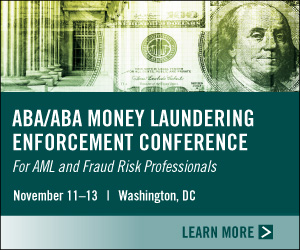A stroll down memory lane: remember paperwork reduction?
The non-legacy of "EGRPRA"
- |
- Written by Nancy Derr-Castiglione
- |
- Comments: DISQUS_COMMENTS

I was taking a stroll down memory lane recently (actually, I was cleaning out some old files) and ran across a Joint Report to Congress, dated July 31, 2007, on the Economic Growth and Regulatory Paperwork Reduction Act (EGRPRA). The Federal Financial Institutions Examination Council published the report in the Federal Register on Nov. 1, 2007, if you want to look it up.
The report was one of those legally mandated affairs. This law had a lot to do with regulatory burden reduction for financial institutions.
Remember those days?
Suggestions made, and what came of them
The Act required the federal banking agencies and Exam Council to review their regulations at least once every ten years to identify outdated and unnecessary regulatory requirements on financial institutions and eliminate them as appropriate. This report was the result of their ten-year review since the Act was passed in 1996.
It covered a great deal of territory, from applications and banking operations to securities and safety and soundness regulations. I'm going to highlight some of the compliance topics that caught my attention and see where we stand after five years down the road in 2012. These are some of the issues raised in the public comment process and the agencies' responses, if any.
1. The Bank Secrecy Act CTR reporting threshold of $10,000 should be raised and the CTR form should be simplified to require less information.
The agencies determined that any such changes were premature at that time. In the meantime, the new CTR e-form that keeps getting a delayed mandatory usage date has greatly expanded the number of data fields required.
2. The CTR exemption process should be made less burdensome by adopting a seasoned customer exemption (making it easier to exempt seasoned customers from the requirement to file regular CTRs for transactions of more than $10,000).
The agencies determined that any such changes were premature at that time.
But, in 2009, FinCEN did adjust the exempt person rules in BSA by shortening the length of time a customer had to be a customer of the bank in order to qualify to be considered for an exemption. The period was shortened to two months, from one year.
3. The recordkeeping requirements (CIP) of the USA PATRIOT Act should be revised to make them less burdensome.
Nope. Sorry. But thanks for your comments.
Currently, there is a FinCEN proposal out that would create a new Customer Due Diligence regulation that would mandate additional requirements relating to the identification of beneficial owners of accounts and expand the scope of "customer" beyond the existing CIP regulation.
Not exactly less burdensome.
4. The prohibition against paying interest on demand deposits under Regulation Q should be eliminated.
That got done in Dodd-Frank Act. (Editor's note: And thus far, it's pretty much been a nonevent, in today's rate environment.]
5. More institutions should be exempt from coverage of the Home Mortgage Disclosure Act (HMDA). And the reporting burden of HMDA, especially for higher-priced mortgage loans, should cover fewer institutions as well.
Not gonna happen.
Instead, HMDA-reporting institutions are waiting to hear about the expanded reporting responsibilities that are mandated by Dodd-Frank Act as soon as regulations are issued.
6. Simplify Truth in Lending and RESPA disclosures and make them more understandable for the consumer.
The agencies responded that they were currently in the process of doing just that. In fact, the EGRPRA that was enacted in 1996 included Section 2101 that required the Fed and HUD within six months of enactment to simplify and improve RESPA and TILA disclosures and provide a single format for these disclosures.
7. The right of rescission under Regulation Z for certain transactions should be eliminated--or at least it should be easier for consumers to waive their right to rescind without having to have a serious personal financial emergency.
Something to think about, but no.
Instead, changes to Regulation Z from a few years ago have given us a new waiting period between the early disclosures and loan consummation. Consumers also may not waive that waiting period unless there is a personal financial emergency.
8. Flood insurance requirements for small loans (more than the existing $5,000 threshold) should be reduced. Requirements should be eliminated for loans on properties secured by only dilapidated structures.
Such changes should come from Congress, instead of the federal banking agencies.
9. Regulation CC maximum hold periods should be extended.
Instead, hold periods have been shortened with the elimination of the nonlocal checks category.
10. The CRA Sunshine rules should be repealed.
All the agencies supported this idea, but Congress needs to act. No change. (The rules require disclosures of bank agreements with community groups and other nongovernmental players.)
11. The adverse action notice requirements under Regulation B should be simplified to make it easier to determine the circumstances in which an adverse action notice is required.
The agencies did not support this change. Since then, risk-based pricing notices have been added.
12. The Regulation E requirement for periodic statements for consumers with online access to account information should be eliminated.
The agencies did not support this idea without additional study. No change.
13. Streamline, simplify, and improve the effectiveness of the Regulation DD (Truth in Savings) disclosures to make them more understandable for consumers.
The agencies said that this will be considered by the Fed the next time it does one of its periodic reviews of this regulation.
However, the only change since then has been the addition of a new disclosure requirement of total overdraft and returned item fees to the periodic statements.
The reduction that never happened
Granted, there is much more to this report than this small glimpse of the consumer protection issues.
But, in the consumer protection regulatory burden department, there hasn't been much paperwork reduction from the Economic Growth and Regulatory Paperwork Reduction Act of 1996.














